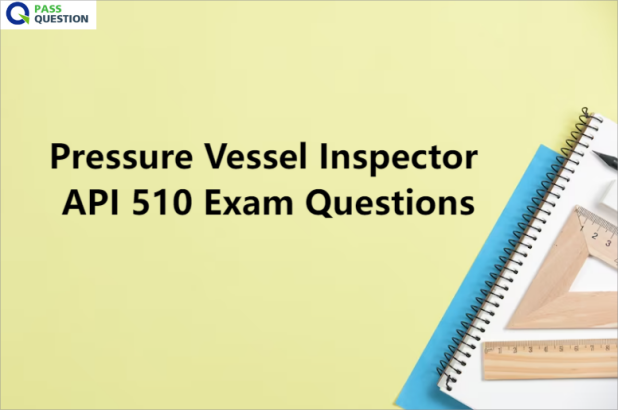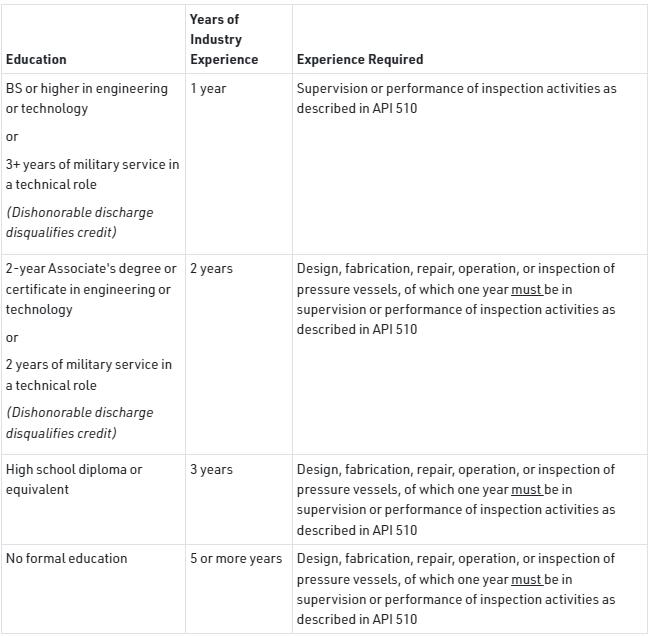Pressure Vessel Inspector API 510 Exam Questions
API 510 serves as a guide for internal and external inspections, as well as on-stream and thickness measurement inspections of pressure vessels. PassQuestion offers the most up-to-date Pressure Vessel Inspector API 510 Exam Questions, which thoroughly cover all the important objectives needed to test your knowledge. These questions are designed to help you understand the material better and ultimately assist you in passing your exam successfully by giving you a clear idea of what to expect. The Pressure Vessel Inspector API 510 Exam Questions provided by PassQuestion include various question types that mimic the actual exam, allowing you to practice effectively and build confidence.

API 510 - Pressure Vessel Inspector
Certified API 510 Pressure Vessel Inspectors must possess extensive knowledge in the areas of maintenance, inspection, repair, and modification of pressure vessels. The purpose of the API 510 examination is to assess whether candidates have this expertise. The exam spans 7.5 hours, including a brief tutorial session, 2.75 hours for the closed-book section, a 45-minute lunch break, and 3.75 hours for the open-book section. In total, the exam comprises 170 questions, with only 140 being scored; the remaining 30 are pretest questions. The exam includes 110 closed-book questions and 60 open-book questions.
This certification program benefits employers and the industry as a whole by helping to:
- Improve management control of process unit operation, repair, and maintenance
- Reduce the potential for inspection delays
- Provide a continued high level of safety through the use of highly specialized and experienced inspectors
- API 510 certification is valid for a three-year term and is accredited by the American National Standards Institute (ANSI). This accreditation ensures that the exam has been developed to the highest standard for openness and integrity and meets the rigorous requirements established under the International Organization for Standardization (ISO) 17024.
Are you qualified to take the API 510 exam?
As outlined in the Appendix B of the API 510 Standard, the minimum qualification requirements for API 510 Pressure Vessel inspector certification are based on the combination of education and experience related to pressure vessels. This experience must have been acquired within the last 10 years while employed by, or under contract with, an authorized inspection agency as defined in API 510.
Based on the 10th edition of API 510, a National Board certification is no longer accepted as a substitution for passing the exam.
Prior to submitting an application, please use the table below to determine if you qualify to take the API 510 exam. The minimum experience required MUST be documented on your application and will be verified after your application has been submitted.

Pressure Vessel Inspector Exam Topics
Thickness Measurements, Inspection Intervals and Vessel Integrity
- Corrosion Rates and Inspection Intervals
- Joint Efficiencies
- Static Head
- Internal Pressure
- Pressure Testing
- Impact Testing
Welding Procedure and Qualification Evaluation
Nondestructive Examination
Practical Knowledge - General
Practical Knowledge - Specific (API 510, Pressure Vessel Inspection Code)
View Online Pressure Vessel Inspector API 510 Free Questions
1. What action is required under API-510 if a pressure vessel's corrosion rate exceeds expected values?
A. Immediate shutdown
B. Recalculation of the vessel's remaining life
C. No specific action required
D. Notification of the API
Answer: B
2. Which of the following does API-510 specifically require to be assessed during an external inspection?
A. External paint condition
B. Insulation condition
C. Foundation condition
D. Nearby electrical installations
Answer: C
3. The definition of pressure vessels is:
A. A container designed to withstand internal or external pressure
B. A vessel for the containment of process fluids with or without internal pressure
C. A container designed to operate below atmospheric pressure
D. A container no greater than 8” in cross section
Answer: A
4. According to API-510, which type of record must be permanently maintained for a pressure vessel?
A. Repair records only
B. Inspection records only
C. All records related to the vessel’s design, fabrication, inspection, and repairs
D. Only the most recent inspection record
Answer: C
5. What is the required action under API-510 if a pressure vessel shows signs of significant deterioration before the next scheduled inspection?
A. Continue operation until the next scheduled inspection
B. Perform an immediate unscheduled inspection
C. Increase the operating pressure
D. Decommission the vessel
Answer: B
6. The pressure vessel owner/user is required to maintain a permanent and progressive record.
These records shall contain all but which of the following?
A. Names of all authorized inspection personnel
B. Operating and inspection history
C. Construction and design information
D. Repair, alteration, and re-rating information
Answer: A
7. When does the API-510 Inspection Code apply?
A. Vessels constructed to API-572
B. Vessels after they have been placed in service
C. Pressure vessel being fabricated to ASME Section VIII, Division 1 or 2
D. Only pressure vessels being fabricated for refinery/petro-chemical service
Answer: B
8. What should contain in a progressive record for a pressure vessel?
A. Construction and design information, operating and inspection history
B. A complete weld map from the original construction plans
C. The exact location on a facility plan
D. The schedule and piping sizes for the vessel
Answer: A
9. Which of the following is not a responsibility of a pressure vessel inspector according to API-510?
A. Ensuring compliance with safety standards
B. Designing pressure vessels
C. Performing inspections
D. Documenting inspection findings
Answer: B
10. Discuss the ethical responsibilities of pressure vessel inspectors under API-510.
Answer: The ethical responsibilities of pressure vessel inspectors under API-510 include maintaining integrity, objectivity, and impartiality in their inspection practices. Inspectors are expected to perform their duties based on sound technical knowledge and adhere to the highest standards of safety and compliance. They must avoid any conflicts of interest and ensure that their decisions and recommendations are based solely on their professional assessment of the vessel's condition. Additionally, inspectors are obligated to report any safety concerns or compliance issues they discover during their inspections, regardless of potential implications for operations or management.
- TOP 50 Exam Questions
-
Exam
All copyrights reserved 2025 PassQuestion NETWORK CO.,LIMITED. All Rights Reserved.

